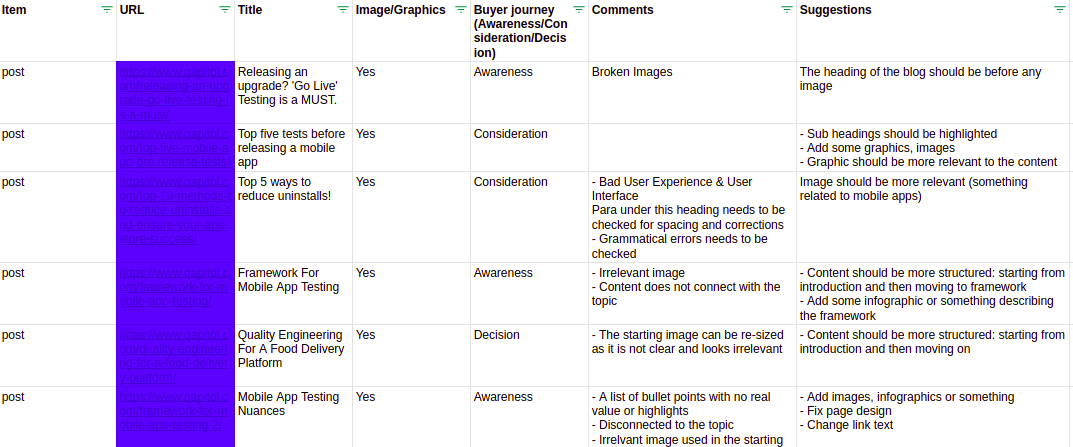A well-structured site benefits user experience and contributes to better search engine rankings. A key part of any technical audit is diving into your site’s internal link structure. You’ll want to ensure that your top pages are receiving the necessary link juice and that your site’s hierarchy is logical and user-friendly for both human visitors and search engine crawlers. Peek behind the curtain of your competitors’ success by analyzing their keyword rankings, backlink profiles, content strategies, and site structure. Armed with these insights, you can adapt your approach and outrank them in the search results. The biggest off-page factor is backlinks — links from other websites that point to your site.
Gather Technical and Performance Data
 Whether it’s slow page load times, broken links, or issues with mobile responsiveness, these tools can pinpoint the exact areas that need attention. By addressing these technical issues promptly, you not only improve user experience but also signal to search engines that your site is reliable and user-friendly. Once the audit is complete, a detailed report of findings and recommendations is provided to improve the website's SEO performance. These recommendations may include updating content, improving website structure, optimizing meta tags and descriptions, and building high-quality backlinks.
Whether it’s slow page load times, broken links, or issues with mobile responsiveness, these tools can pinpoint the exact areas that need attention. By addressing these technical issues promptly, you not only improve user experience but also signal to search engines that your site is reliable and user-friendly. Once the audit is complete, a detailed report of findings and recommendations is provided to improve the website's SEO performance. These recommendations may include updating content, improving website structure, optimizing meta tags and descriptions, and building high-quality backlinks.
- Check for any hiccups in indexing and crawl your website to uncover technical glitches.
- Engaging with resources like specific sector case studies further enriches your understanding and execution of comprehensive SEO audits.
- On the other hand, the robots.txt file instructs search engine crawlers on which pages to crawl and which to exclude.
- For Largest Contentful Paint (LCP), which measures loading performance, ensure that the largest content piece on your page loads within 2.5 seconds.
Identifying High-Ranking Keywords
Optimizing your pages has to be one of the most tedious works of owning a website. Aside from keeping your content up-to-date, you must ensure every on-page link works so your clients and search engines can interact with your site without a hitch. Content syndication refers to a marketing strategy where you republish content on other online platforms and websites. Some examples include social media channels, popular websites in similar niches, or other related platforms. Website management is crucial if you want to make a lasting online presence. Poorly managed websites with clunky, spammy, unsecured, and outdated content easily vanish into the internet abyss—even avoided by most users.
Keep a SEO audit checklist close at hand as a guide for ongoing refinement (you can find one in our shop). Continuously update your strategies to include fresh keywords, enhance user experience, and adjust to changes in Google’s algorithm. On the flip side, off-page SEO audits take a gander at the external factors swinging your site’s rep, like backlinks from other sites. By building high-quality backlinks, you can boost your site’s authority and improve its position in search engine results pages.
Tools like Google Keyword Planner, SEMRush, and Moz's Keyword Explorer can assist in finding high-volume and relevant keywords. Backlink profile evaluation involves analyzing the quality and quantity of backlinks pointing to your website. It includes assessing the diversity, relevance, and authority of these links.
Conclusively, conducting a comprehensive SEO audit is a crucial step in identifying and fixing website issues that may be hindering your online presence. Do not forget, https://david-skovbjerg-3.technetbloggers.de/mastering-seo-for-multilingual-case-studies-top-strategies-for-success-1722638635 is not a one-time task, but rather an ongoing process that requires regular monitoring and adjustments to stay ahead of the competition. Ultimately, it seeks to ensure that a website is optimized to achieve the highest possible search engine rankings, steering a path that maximizes organic traffic flow. Anecdotal evidence shows us that conducting an SEO audit can have a significant impact on the success of a website.
Many tools actually have a maximum size, at least on the lower-priced plans. In addition to keyword research, it helps with PPC competitive research, SEO competitive research, and the creation of custom lists and domains. Aside from that, the tool checks your links 24/7 and informs you of any changes so you can take immediate action in case a link is lost or broken. Whether it’s slow page load times, broken links, or issues with mobile responsiveness, these tools can pinpoint the exact areas that need attention. By addressing these technical issues promptly, you not only improve user experience but also signal to search engines that your site is reliable and user-friendly. Once the audit is complete, a detailed report of findings and recommendations is provided to improve the website's SEO performance. These recommendations may include updating content, improving website structure, optimizing meta tags and descriptions, and building high-quality backlinks.
Whether it’s slow page load times, broken links, or issues with mobile responsiveness, these tools can pinpoint the exact areas that need attention. By addressing these technical issues promptly, you not only improve user experience but also signal to search engines that your site is reliable and user-friendly. Once the audit is complete, a detailed report of findings and recommendations is provided to improve the website's SEO performance. These recommendations may include updating content, improving website structure, optimizing meta tags and descriptions, and building high-quality backlinks.